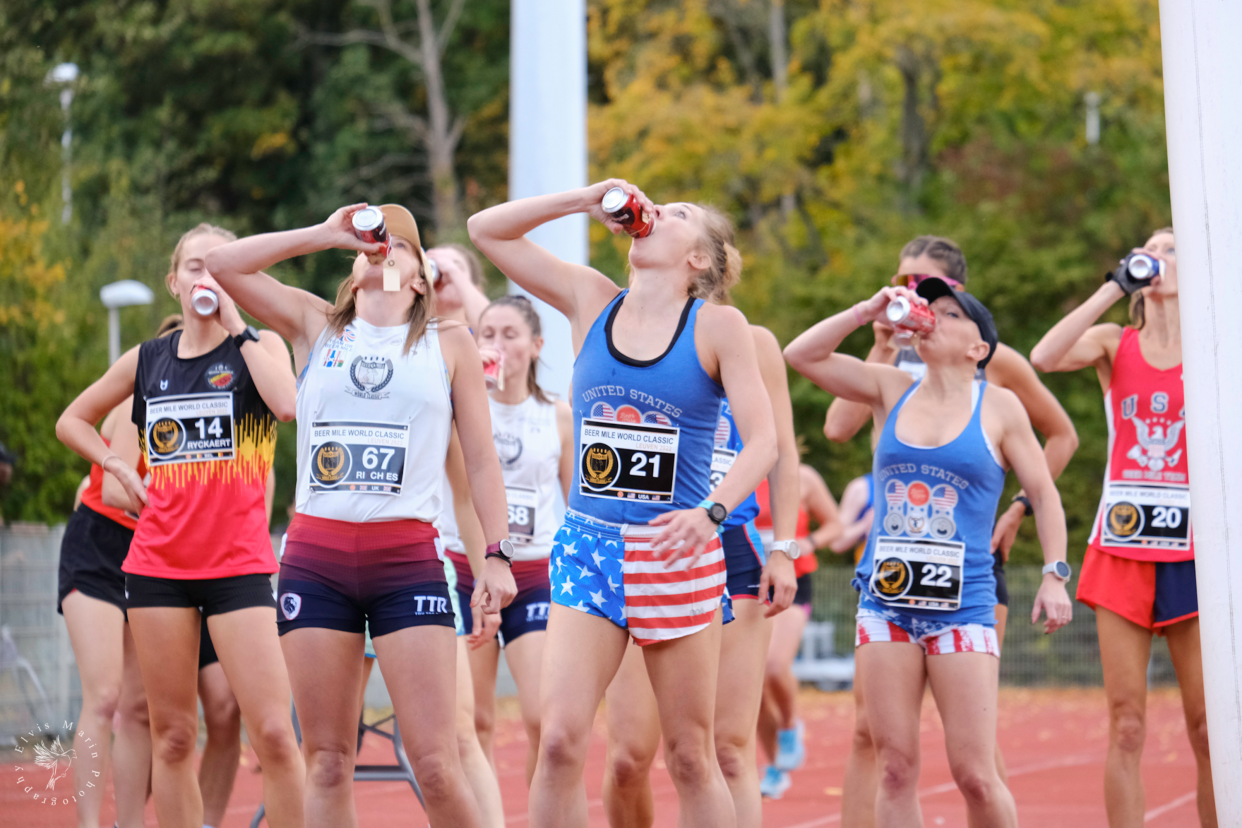A Switch to Cans Creates Chaos at the Beer Mile World Classic

Elvis Marin
The eighth annual Beer Mile World Classic was held this past weekend on October 15 in Leuven, Belgium — and perhaps the most intriguing storyline is a debate beer drinkers have been having for generations: bottles versus cans.
The Beer Mile World Classic — billed as "the world's premier drinking race" where contestants must chug a 12-ounce beer of at least 5 percent ABV before each lap of a mile — has been run since 2015 in locales literally around the world: San Francisco, London, Vancouver, and, last year, Manchester (an exciting food city!). At least 13 countries were in attendance this year, with 68 total finishers recording an average time of just under 8 minutes, 22 seconds.
But a rule tweak was the main headline: For the first time, organizers Beer Mile Media required all competitors to use cans instead of bottles, which in previous events had been the choice of most runners. "Bottles are known to be quicker to chug and create less foam while chugging," Beer Mile's Chief Chug Officer Chris Robertson explained to me via email. "The main reason cans were used this year is because the host venue doesn't allow glass on the premises. But the original rules of the beer mile dating back to the 1990s only allowed cans, so this event was also a bit of a throwback. Bottles were not allowed in the official rules until 2014."
The decision to ax bottles — runners drank cans of 5.2 percent ABV Jupiler, a Belgian lager, instead — was more impactful than non-beer milers might realize. (Worth noting is that cans have to be drank from the top and can't be "shotgunned.") "The switch to cans definitely made times slower," Robertson continued.
Canadian Corey Bellemore won the men's race for the second year in a row (and the fourth time overall), but after setting a new beer mile world record of 4 minutes, 28 seconds in 2021, this year, he was only able to lay claim to a new "canned beer mile" record after finishing in just under 4 minutes, 50 seconds. That said, the back-to-back champion didn't have much need to run any faster: He won the race wire-to-wire, beating the second place finisher — Sweden's Emil Granqvist — by 15 seconds.
Meanwhile, cans or not, the women's race was chaotic. America's Elizabeth Laseter crossed the line first with what would have been a world-record 6 minute, 15 second finish — but she was disqualified for drinking outside of the allotted nine-meter "chug zone." The second person to cross the line, Britain's Laura Riches, was also disqualified. And so America's Melanie Pozdol was declared the winner despite technically crossing the line third with a time of 6 minutes, 41 seconds.
And yet, Robertson said cans weren't to blame. "There were a normal amount of disqualifications this year," he explained. "The main reason for an athlete to get disqualified is having more than 4 total ounces of fluid/foam remaining across the 4 beers. Containers are collected during the race and measurements occur after the race. Even when using bottles, athletes still run into disqualification issues if they are not patient about getting all of the beer down in the chug zone."
"This isn't the first time where the person who won the world championship race ended up getting DQ'ed," he added. "When you are going that fast and chasing world record times, sometimes mistakes are made."
Still, Pozdol apparently came prepared. "Cans are different than bottles, for sure," she said according to the site Outside, "but I practiced with La Croix, which is more difficult to chug than beer. Too much carbonation!"
Meanwhile, three-time defending champ and world record holding female Alli Grace Morgan admitted she struggled with the switch, accounting for her crossing the line fifth and getting herself disqualified. "I have never chugged cans and couldn't quite get it right," she told Outside. "I still finished as well as I could. It's one of those challenging races that can go so many ways. I was out of my comfort zone from the start and behind significantly due to chugging poorly."
Overall, the U.S. women won the team prize, while the top men's team was the United Kingdom.
The next Beer Mile World Classic will be heading back to the States — Chicago on July 1 — and expect faster times: Bottles will be allowed again.

